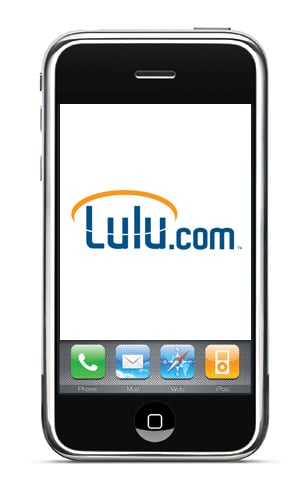
Lulu.com is one of my favorite websites…well, pretty much ever. I love that they provide an easy and cost effective method for people to publish their own work in a professional way. It opens up the world of print to a variety of genres, sub-genres, and sub-sub genres, that might never see the light of day by other means.
Now, however, Lulu is taking things one step further for those of you that are really into the idea of electronic books. Ebooks, as it were. Lulu has added ebook optimization to their service that not only formats a PDF designed to work with Sony’s eBook Reader…but also the iPhone.
I’ve been reading a few books from dailylit.com on my iPhone recently, and I’m very pleased with the results. I can’t wait to get a few novels of my favorite pulp fiction stories and sit back for a comfy evening of reading…on my iPhone.




One thought on “iPhone eBooks from Lulu.com”
Lulu is a serious LOSER for publishing a book. We used to go through them, but we learned. Bookstores, libraries, and wholesalers won’t go near your books because they cannot obtain them from you at legitimate trade rates. This means a 55% discount from the retail price on the barcode.
Example: Say you want to publish a 150-page paperback in six-by-nine inch size. At Lulu.com that book will cost you, the publisher, about $8.40 a copy. Typical retail on such a book is about $10. So, since you obviously can’t offer up a ten dollar book at 55% off ($4.50) you will get few, if any sales.
Question…How CAN you do it? Easy. You make your print provider the same one as the big boys use: Lightning Source. LSI is the print provider linked with Ingram, the biggest database for books in the world. LSI will get that same book into your hot little hands for a mere $3.00 a copy, meaning you can offer it up wholesale at $4.50 and still make a cool $1.50 per sale. That’s MORE per copy than Random House typically makes, because unlike you, they have big overhead expenses.
Some people say this about Lulu: ‘Well, I can purchase an ISBN from them and my book will appear on Amazon…’
That’s right. You can buy a number and they will stick you on Amazon. This service costs $150. Meanwhile, you can pay Lightning Source $75, purchase your own set of ISBN’s for your book from Bowkers, and assign a barcode from Bowkers for another $25 and THEY will make your book appear not only at Amazon, but on every legitimate book site in the world.
Remember: Lightning Source is OWNED by Ingram. You know them. They practically OWN the database globally for books. They are the producers of Books in Print, the big reference, and for an extra fifty bucks LSI will put your book on the Ingram New Release Annotation. This is a monthly reference that places your cover picture and description in sight of more than 10,000 wholesalers, bookstores, and book jobbers. Once they see they can get your books wholesale, you will get sales.
Don’t waste your time with Lulu. Do this instead: Pony up $250 and buy a set of ten ISBN’s from Bowkers. (The only legitimate US source). Set up a business bank account in the name of a publisher, even if it is only ‘Joe Smith Books’. Then use these things (required) to set up your account at LSI.
Clean and perfect your interior text. Design a good cover using the LSI cover template, which is based on the page count of the book for thickness. You just install the cover images and spine and fit them within the lines. You can do this with almost any imaging program. Upload your cover file and your interior text file to LSI and pay the $75 upload fees. You get a lot for this money, such as those things I mentioned above. Pay the additional $50 (billed to you 120 days after book release) to get on the Ingram Annotation.
And you are all set. Now you can offer up at wholesale and hold your head high. You are ready to move into marketing efforts. Those ten ISBN-13’s you bought are your own assigned prefix, and they have no expiration date. You are good for ten books now.
Robert M Blevins
Managing Editor
Adventure Books of Seattle